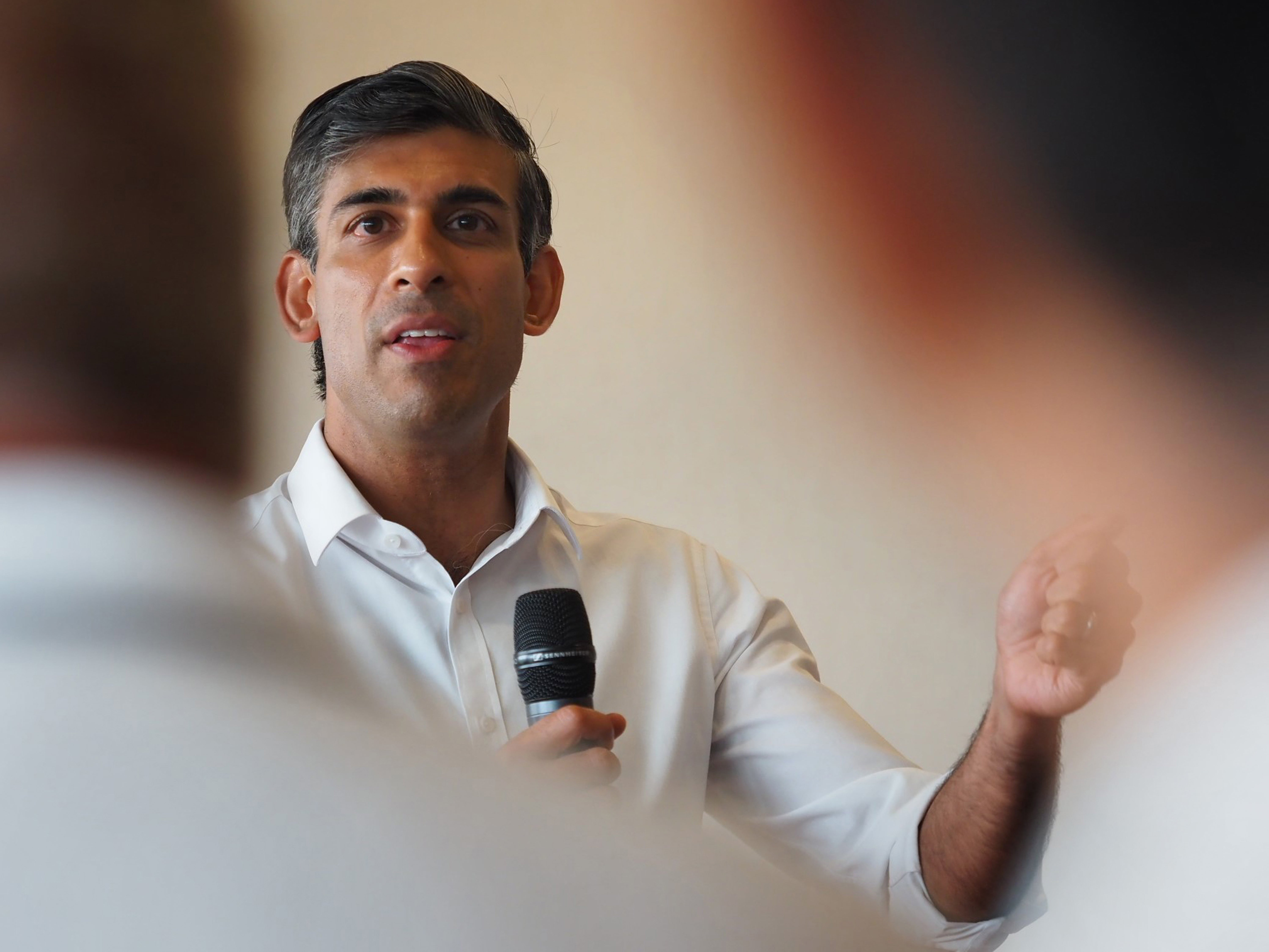Sunak defines ‘vilification of the UK’ as extremism in terrorism policy proposal
Leadership candidate also wants to ‘reform’ Prevent programme - but government-commissioned review already underway

Your support helps us to tell the story
From reproductive rights to climate change to Big Tech, The Independent is on the ground when the story is developing. Whether it's investigating the financials of Elon Musk's pro-Trump PAC or producing our latest documentary, 'The A Word', which shines a light on the American women fighting for reproductive rights, we know how important it is to parse out the facts from the messaging.
At such a critical moment in US history, we need reporters on the ground. Your donation allows us to keep sending journalists to speak to both sides of the story.
The Independent is trusted by Americans across the entire political spectrum. And unlike many other quality news outlets, we choose not to lock Americans out of our reporting and analysis with paywalls. We believe quality journalism should be available to everyone, paid for by those who can afford it.
Your support makes all the difference.Rishi Sunak has announced plans to include the “vilification of the United Kingdom” into an official definition of extremism.
In a series of policy proposals on terrorism, the Conservative leadership candidate also claimed he would “refocus” the Prevent programme on Islamist extremism.
The controversial scheme, which has been accused of both ineffectiveness and over-reach, has been under independent review for three-and-a-half years.
The review has missed numerous deadlines and the Home Office has not yet published a final report by William Shawcross, the former head of the Charity Commission.
The government also set up the Commission for Countering Extremism but then ignored a flagship report that set out a definition of hateful extremism in October 2019.
“There is no more important duty for a prime minister than keeping our country and our people safe,” Mr Sunak said.
“Whether redoubling our efforts to tackle Islamist extermism or rooting out those who are vocal in their hatred of our country, I will do whatever it takes to fulfil that duty.
The announcement appeared to misunderstand how Prevent, which aims to stop terror offending and divert people away from terrorist ideologies, operates and conflate its scope with non-violent extremism.
“In order to identify and root out extremism in all its guises, Rishi will widen the government’s definition of extremism,” it said.
“Rishi believes extremists do not just want to attack our values, but our very existence. That is why he will add vilification of the UK to the definition of extremism, making sure that those with an extreme hatred of our country that leads them to pose a risk to national security can be identified and diverted away from a destructive path.”
The announcement did not set out details of the proposed definition but said it would not be legally binding and “criticism of the government or any government policy will not be included”.
Prevent responds to referrals made by members of the public, which are assessed against a set of tests that are unrelated to a definition of extremism.
The announcement claimed that Mr Sunak would “reform the Prevent programme so that the profile of cases in the programme broadly reflects the terror threat posed to the UK”.
It is not clear how such reform could take place, because the cases in the programme reflect referrals made by police and members of the public, including teachers and health workers, who are bound by a statutory duty to flag extremist concerns.
Official guidance for authorities reads: “Our Prevent work is intended to deal with all kinds of terrorist threats to the UK.
”The most significant of these threats is currently from terrorist organisations in Syria and Iraq, and al-Qaeda associated groups. But terrorists associated with the extreme right also pose a continued threat to our safety and security.“
Speaking to The Independent last week, the Prevent co-ordinator for London said that jihadist terrorism remained the single largest threat to the UK but the far right had been rising for several years.
Detective Superintendent Jane Corrigan added: “Although Islamist still by far the greatest threat, in the under 18s there are more young people being arrested in terms of the extreme right-wing, which is a worrying trend.”
In the year to March 2021, referrals over potential extreme-right wing extremism (25 per cent) overtook Islamist extremism for the first time (22 per cent).
The highest proportion - more than half - were classified as over a “mixed, unstable or unclear ideology”, which can include a combination of different or shifting ideologies, or people obsessed with violence and school shootings.
Far-right extremists also made up the largest group of people taken forward into the Channel deradicalisation scheme, on 46 per cent, with islamists on 22 per cent.
Of the 14 terror attacks declared in Britain since March 2017, 10 have been carried out by jihadists, two by far-right extremists and two by people whose ideology has not been stated.
In the same period, security services say they have foiled 32 terror plots, of which 18 were jihadist, 12 extreme right-wing and two labelled as “single issue terrorism”.
Several attacks and plots, including the Streatham stabbings and Fishmongers’ Hall murders, have been carried out by previous terror offenders who had been released from prison.
Mr Sunak claimed that Dominic Raab’s plan to abolish the Human Rights Act and replace it with a Bill of Rights would “make it easier to separate terrorists from the general prison population”.
He said he would create a new offence of encouraging terrorism or supporting a banned group “in a prison cell”.
The announcement said he would also “weed out and cut off publicly funded organisations that are promoting extremism in the UK”, but did not give details of any such groups.



Join our commenting forum
Join thought-provoking conversations, follow other Independent readers and see their replies
Comments